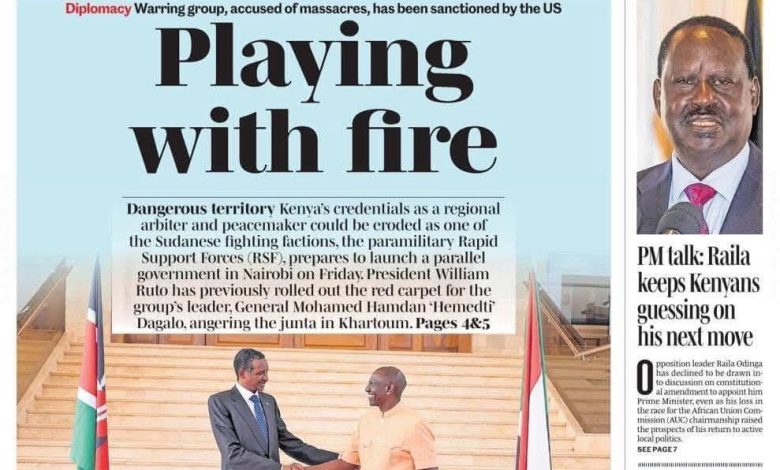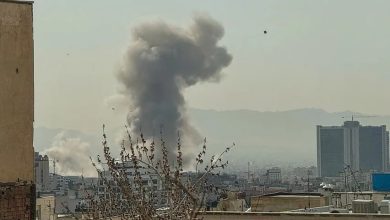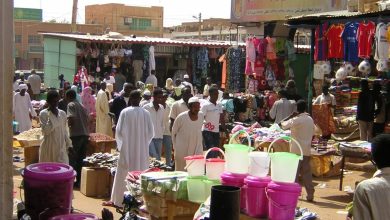What is the Impact of Kenya Hosting the Rapid Support Forces Conference on Its Regional Role?

Sudan Events – Agencies
In a move that sparked mixed reactions both locally and internationally, the Kenyan capital, Nairobi, hosted a conference organized by Sudan’s Rapid Support Forces (RSF) on Tuesday. The event aimed to announce the formation of a parallel government in Sudan.
This development, reflecting an escalation in the Sudanese crisis, resonated widely in the Kenyan press, with varied coverage highlighting political and diplomatic tensions between Kenya and the Sudanese government.
Major Kenyan newspapers addressed the event from different perspectives, focusing on its potential impact on bilateral relations between Sudan and Kenya, as well as Kenya’s regional role in the Sudanese crisis.
“Another Diplomatic Mistake”
In an article titled “Another Diplomatic Mistake,” The Standard analyzed and criticized Kenya’s hosting of the conference, describing it as “yet another diplomatic error” by the Kenyan government.
The newspaper quoted Sudanese officials accusing Kenya of interfering in Sudan’s internal affairs, considering this step as implicit support for the RSF in its conflict with the Sudanese government.
The report also highlighted that this escalation could further complicate bilateral relations between Khartoum and Nairobi at a time when Kenya faces challenges in its foreign policy.
“Playing with Fire”
Meanwhile, The Daily Nation published an article with the provocative headline “Playing with Fire,” examining Kenya-Sudan relations from a broader perspective. It pointed out that the Sudanese government has accused Kenya of bias due to this event.
The newspaper questioned the nature of the relationship between Kenyan President William Ruto and the RSF, especially amid ongoing debates about Kenya’s role in the Sudanese crisis.
The report suggested that the Sudanese government might view this move as an attempt by Kenya to expand its influence in the Sudanese conflict, which could expose Kenya’s regional interests to greater diplomatic risks.
“Diplomatic Disputes on the Horizon”
On the other hand, The Star chose a direct headline: “Diplomatic Disputes on the Horizon as Kenya Hosts Sudan’s Hemeti Group.”
The newspaper emphasized that Kenya’s decision to host the RSF conference could place it in a diplomatic dilemma, especially as regional tensions escalate.
The article suggested that this move could lead to increased friction between Kenya and Sudan, particularly if Khartoum escalates its response.
Amid rising regional tensions in the Horn of Africa, The Star questioned whether Kenya could maintain its political neutrality in this complex crisis.
Delayed Announcement of a Parallel Government
In contrast, Capital FM offered a different perspective in its report titled “Sudan’s RSF Delays Announcement of Parallel Government with Allies in Nairobi.”
The report viewed the delay as an indication of internal challenges within the RSF, as there were ongoing discussions on how to respond to international and local reactions to the move.
It also suggested that this delay might have given Kenya time to assess the situation before taking any further steps that could affect its international standing.
Why Did Kenya Accept?
According to journalist Noé Michalon, East Africa correspondent for Africa Intelligence, the change in U.S. administration has given more political freedom to certain actors, including RSF leaders who were previously under U.S. sanctions.
Michalon told Al Jazeera Net that this shift in U.S. policy has eased pressure on Kenya, making it easier for Nairobi to host the conference.
He added that the relationship between Kenyan President William Ruto and RSF leader Mohamed Hamdan Dagalo (Hemeti) is not new, as the two have met several times in the past. This raises questions about their ties.
Michalon also suggested that Kenya’s stance might be part of a broader strategy to support the RSF’s efforts to present itself as a political and civilian entity. The RSF has already appointed representatives in Europe to persuade governments to recognize them. Kenya appears to be assisting these efforts, placing itself in a diplomatically sensitive position.
Potential Consequences
Regarding bilateral relations, Michalon noted that the Sudanese government in Port Sudan issued a strongly worded statement condemning Kenya’s hosting of the conference, making any near-term cooperation or dialogue between the two countries unlikely.
He added that relations between the two nations have already suffered significant damage that may be difficult to repair, especially as tensions escalate.
Speaking to Al Jazeera Net, Michalon described the event as the “final nail in the coffin” for Kenya’s attempt to position itself as a neutral mediator in the Sudanese conflict.
At the start of the war, the Intergovernmental Authority on Development (IGAD) proposed President Ruto as a mediator, but this initiative failed due to allegations of his close ties with the RSF.
Michalon argued that this hosting effectively ends Kenya’s diplomatic role in Sudan’s crisis, which could also damage its reputation as a supporter of peaceful resolutions in other regional conflicts, such as the crisis in the Democratic Republic of the Congo.
Source: Al Jazeera Net



